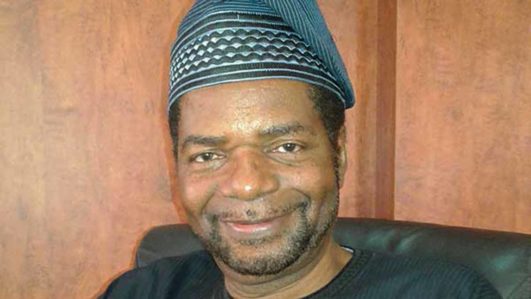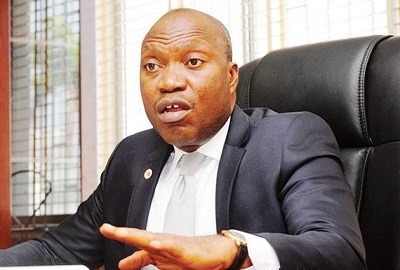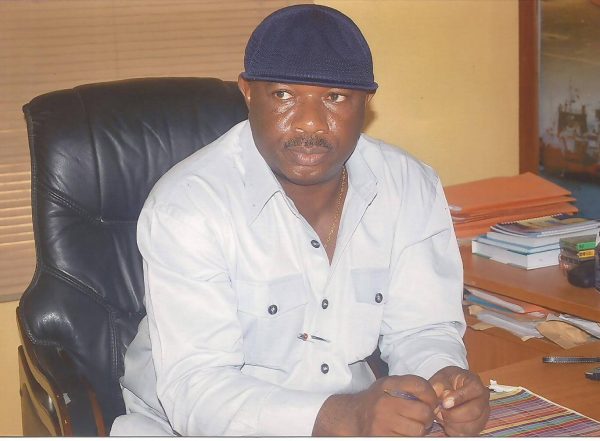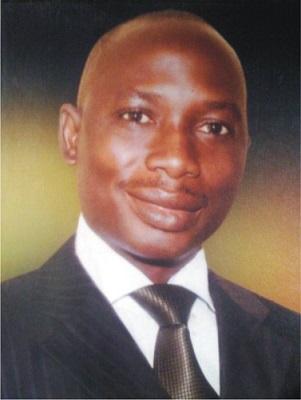There Is A Rot In The Whole Civil Service System – Goke Adegoroye

Goke Adegoroye is the pioneer Director General of the Bureau of Public Service Reforms, in this interview on Arise TV monitored by MMS Plus, Dr Adegoroye spoke about the current scandal of job racketeering rocking the commission and other issues. EXCERPT
The Federal Character Commission Is Embroiled In A Messy Scandal, With All This In The Public Domain, Would You Say That The Commission Is Or Can Still Fulfill Its Mission?
Any agency or body of government set up with a clear-cut mandate will be expected to fulfil its mission. Right. And this one will certainly fulfil its mission too. It’s just that what you have right now is a crisis of human relations.
I’m very familiar with what’s going on in that Commission. Because when new boards of agencies and commissions are set up, I’m usually one of the lead facilitators to come and make papers for them. And this particular set of Commission, I was with them in May 2020 to present a paper on guides to administrative procedure. Even at that time, I already knew that there were already some other issues on the ground, I mean, problems. The fire was already on the mountain.
And I had to go into resolving some of their initial crisis, their perception of the relationship between the Commissioners and the Chairman. To the point that usually when I do those things, I make myself also available as a mentor. And they did visit me quite a number of times. Even the Chairman visited my house for me to be able to guide her on what to do.
So, it’s a tragedy. But at the time that I went to present the paper, they had already been sending petitions to the President. Their first series of petitions was actually in December 2020. And yet they were sworn in in July, barely five months. So what you see there is a crisis of management and the kind of styles that they have. But as it were, you will also find out that the majority that kept quiet had a sober mind and wanted to do things, hoping that certain things would be done properly.
And as for the job racketeering you’re talking about, that’s not the first time. Previously, it has also happened. What is happening here is that it is being sold. Previously, the idea of getting slots and sharing is not limited to the Federal Character Commission alone. Let’s be honest. It’s like for all the chains of getting the approval to get the number to including those who are probably the National Assembly. everybody is part of the sharing. The only thing is that in this case, it is being sold.
This Corruption Within The System That You’re Talking About; Job Racketeering, Paying For Slots And All Of That, Is It Peculiar To This FCC Or Is It A Rot That’s Eaten So Deep Into The System? Now, How Do You Begin To Even Clean It Up? Because This Apparently Calls For, You Know, Urgent Cleaning Up Of The Public Service. Where Do You Start From?
It’s a rot that is all through the whole system. Some of us have written, and in my books, all of these have been said, that part of the challenge of capacity and of competence that you have in the service, stems from the fact that appointments are patronage driven rather than competency-based.
So you see that anytime there is a vacancy anywhere, even vacancies that are not there, will be created. And those in powerful positions, from the National Assembly to those in the executive offices as Ministers and so on, are there. But it’s also the challenge of the Nigerian society because the moment you are in positions everybody will be, you know, swimming around you, asking you to put their own people into positions.
And so under this kind of pressure, out of sympathy, you also want to be able to do something. Because when you now finish your tenure, part of the reason, you know, part of the ways they’re going to measure whether you’ve done well is whether you’ve been able to get some people from your area or from your constituency into jobs. What makes this one blow up is this allegation of paying for it. This is not the first time. When I was Permanent Secretary of FCT and some of the members of the commission came to me in 2010, I lambasted them. And I said, instead of you doing your job, all you are doing here is to find how much of the vacancies can also be given to your members because you’re under pressure. But because you are the regulatory agency, if you succumb to that, it makes it difficult for you to be able to correct.
This particular commission, I told them at the peak of the time that former President Muhammadu Buhari was being accused of, you know, getting most of the appointments to his own area. I said it’s your job to go and help the president.
They said, well, it’s going to be difficult for us to call the president. I said, but that’s your job. Let me tell you how you do it. And I told them what to do. All you need to do is to have quarterly or biannually, you know, assessment of the appointments, of the services, of the infrastructure that has taken place. Just place it before the president. I said, sir, this is the lopsidedness.
In one chapter in my book, I did it during Jonathan’s administration to show that the way Jonathan was, you know, marginalizing Southwest and Northwest, was going to make the two regions gang up together to take power from him. I said that in 2013. And that’s actually what happened in 2015. Go and read the book. You’ll see it there. That was my conclusion. Because the most marginalized zones at that time were those two zones. And the favorable zones were Southeast and South-South. So in the same way, I told this Commission, I said, you are not criticizing government.
It’s for you to present the data. The data will speak for itself. And because when you are making an appointment one at a time, you will not really know that you’re already harvesting everything to your side. But when you present the data, when we were with the Secretary of Government between 1999 and 2004, I was the Head Intern of the Secretary of Government of the Federation. And part of my job was to have a template of these things to be able to show these are the vacancies that are going to occur in the next one year. This is the law.
These are the numbers you’re going to have. And the challenge with the Federal Character Commission is the fact that that is a commission that has representatives from every state of the Federation. So you have 37 people, each of them thinking that they are like ministers and they want to wield power. And the power is not there. There is no contract to award. So, the only thing that they have is this kind of favors. And the favors, they’re not also now being transparent about it. So, these are some of the challenges.
Don’t You Think That The Public Service Reforms Of 1999 To 2007 Should Have Taken Care Of Some Of These Loopholes? How Would You Recommend An Efficient And Effective Public Service Reform In Nigeria?
Reform is not a one-shot injection. It’s a continuous way of improving things. I mean, when I listen to these people, I feel sad because one of the things that I achieved as the Director General of the Bureau of Public Service Reform is what they’re using today. The IPPIS, Integrated Payroll Information System, it was under me that it was installed in 2006.
When we did it, it was saving the government money and so on. And the service provider at that time was System Specs, a company of high integrity. But as soon as we left and got approval that it should be extended service-wide, the people who were there then got some other company to take over. And the company started from the beginning. And then people who were not in government were now getting themselves in. You look at this case, if you are the Head Of Service Of The Federation, he will tell you this is the IPPIS officer in Federal Character Commission. IPPIS officers in all the commissions too are also doing the same thing. We found out, in fact, at that time, I remember my friend’s wife, Joke, she was Director General of the National Council of Arts and Culture, and was telling me after I left the service that she found like about 200 people who had already got their way into IPPIS and were not actually regularly employed.
So, the point I’m saying here is this. A technology that was installed to do something, because the people who are operating it do not have integrity, okay, then it is penetrated. And that is why everywhere I’m talking, whether to government or whatever, I keep on hammering on integrity. Because if you can have people of integrity in key positions, it would translate to a moral right to be able to weigh down on those who are below them.
How Best Do You Think This President Can Avoid Similar Pitfalls? And Of Course, Down The Line With Other Agencies, MDAs, And What Have You, Especially At A Time When, You Know, You Have This Kind Of Issues Being Raised?
Pretty easy. The government has made, or the president, President Bola Ahmed Tinubu has made his own decision to appoint people to represent the political interest and all kinds of diverse interests. And it’s a very beautiful combination that you can see.
What we need to do, the only thing that is left for the president is to go to the bureaucracy. If he can just get it right, and get people who are credible to be in the key positions of the bureaucracy, then everything will fall into place.
Because in reality, what we are seeing here, if you can just, I mean, the person who is in the IPPIS is not a political appointee, he’s a civil servant, okay? But then, some of the challenges you find is that there are people who are bad in the system, but the systems, you know, the processes of the system do not even highlight them enough to be able to get them punished and disciplined and taken out of the system.
I mean, the Nigerian public service is one where you begin to wonder how we can actually tolerate the whole lot of bad eggs that continue to parade the service.
And as I wrote in one of my books, I said, camels of questionable integrity can literally walk through the integrity needle of the public service of Nigeria. So until we’re able to focus on those things and ensure that you bring them out, you continue to have systems like this. You and I were talking before it, and you know agencies where they’re even collecting dollars to be able to get in. Then you begin to wonder how much are they going to pay them.
Where are they going to get this money spent back? But when you look at it too, and you also hear the things that are also happening, that to become director, to become DG, to become permanent secretaries, you’re also paying some people. You then begin to wonder. So all the president has to do, now that these are getting ready, is to now go and focus on the service. And the instrument to use is actually there for him to use.
The tenure policy has just been revived, and that is one instrument that he can use. And everything will fall into place. He should get people who are credible, of impeccable integrity, and then it will cascade down the ladder.
On The Current Crisis Rocking the FCC, I Mean You Said Earlier On The Issue Of Muheeba-Dankaka, One Of The Objections Those Raising Issues Against Her Are Saying Is That She Lacks Cognate Experience, She Lacks The Temperament, Leadership Skills, To Manage Such An Important Commission. I Mean, Do You Think She’s Just Been Victimized, Giving A Dog A Bad Name Just To Hang It?
I’m not here to defend the lady. As I told you, I said I knew a little bit of the background. The problem started from the time that she was appointed because some people felt we need to maintain the regional balance of Nigeria. She’s from Offa in Kwara State. Okay? So, but that’s supposed to be north. And the secretary is from Taraba, also in the north. The way it’s been done before, from the time of Waziri Fika, Dr. Adamu Fika, the Former Head Of Service, a very highly reputable man, the problem is that you have in the north, and then you have the south to be the secretary, and that.
So, in this case, even from the beginning, there are people who are feeling that it was going to be on shaky ground, and the people working for her ouster from the beginning, to ensure that that balance was maintained. So those tensions were there. But the other part is also this. As I told you, not only did I invite her, I mean, I gave her room to come to my house for advice and I advised many of the members. And what I told them is that she must see the commissioners as her peers and that the commissioners should see her as primus inter pares.
And because I said as her peers, some of the commissioners went, they called me back the following day. They said, you see, you said we’re equal. I mean, all of us should be this. And I told them, I’m just trying to help you settle the problem. She’s your boss, if you want to know. But she’s not supposed to treat you like Deputy Directors. You are all commissioners. And the decision of the commission is not a one-man decision. It is the group coming together by vote.
Unfortunately, they have been writing those petitions since 2020, as I told you. This is an extra ministerial department. This is an executive body. It’s not under a ministerial department. The president cannot even remove her immediately. It has to defer to the Senate. Two-thirds of the Senate is required to remove her. So that is actually the thing.








